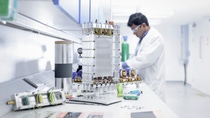Media
How BASF is advancing climate protection solutions through multi-sector collaboration

Climate change impacts our way of life, including the places we inhabit, the food we eat, and the products we use. To protect our climate, it is key to adopt more sustainable practices across the map and innovate. This is what we at BASF aim to accomplish.
As part of BASF’s Sustainable by Design series, we recently brought together experts from diverse backgrounds as well as partners and key stakeholders to discuss initiatives, challenges, and solutions to promote climate protection. Discover these initiatives below and access the on-demand recordings.
1. We pursue novel technologies
Every day, new companies are springing up to find new and more sustainable ways of doing things. Through BASF Venture Capital, we support startups from all over the world to bring forth technologies that can foster climate protection and build a more sustainable future.
Watch Managing Director of BASF Venture Capital, Markus Solibieda and Dr. Eric Toone, Managing Partner and CTO of Breakthrough Ventures, to learn more about the different types of technologies currently under development, such as green hydrogen, and what is to come in terms of innovation and more.
Watch the “Fireside Chat with Breakthrough Energy” session recording
2. We share sustainable agricultural practices and innovations
Climate change is changing agriculture in ways that we have never seen before. BASF is helping farmers fight the effects of climate change through sustainable practices without compromising yield, including altering the size of the crops, tracking and measuring cotton production to improve market value, and helping to identify potential lands for wildlife habitats to increase local biodiversity and soil health.
In this session, the panel discusses all of the above, as well as the different aspects of soil health and how climate change has presented both a challenge and an opportunity to innovate and find new solutions to pressing issues affecting crop productivity.
Watch the “Building Climate Resiliency through Agriculture” session recording
Without soil, we don’t have consistent yield, and ultimately the land is unproductive. So, everything we do, from our technology to practice level, has to go back to building soil health.
3. We contribute to the recycling of plastic packaging
Millions of tons of packaging waste are generated in the United States every year, and the amount recycled is not enough. To take the next steps and grow recycling percentages, we need to consider the infrastructure, the recycling culture in the United States and how we design packaging.
In this session, Brian Schmatz from BASF’s subsidiary, trinamiX, is joined by Tina Wiechman, Senior Research Engineer – Packaging Sustainability from Church & Dwight, and Tyler Matusevich, Sustainability Director of Brook + Whittle, to discuss the current state of sustainable packaging in the U.S., as well as the challenges and common goals set by consumer-packaged goods (CPG) companies to design products that can be easily recycled.
Watch the “Designing Packaging Made to Be Recycled” session recording
4. We drive plastic circularity
Canada is currently challenged to increase its plastic recyclability and overall circularity. In an effort to improve these numbers, BASF Canada launched a program called ReciChain, which brings together all the key players in the market to evaluate new technologies that promote plastic circularity.
In this session, representatives from BASF Canada, including its president, Apala Mukherjee, as well as NOVA Chemicals and Alberta Innovates, discuss the implementation of the program, first adopted in British Columbia, and now expanded to Alberta, its successes and challenges.
6. We help produce sustainable coffee
In collaboration with the United Nations Educational, Scientific and Cultural Organization (UNESCO), BASF’s KAJVE Sustainable Coffee program helps local farming communities and coffee producers in Chiapas, Mexico, and Guatemala by providing technologies and sustainable agricultural practices to improve the quality of the beans and the productivity of the plots.
In this session, you can learn about coffee production in Mexico and Guatemala and the results of this collaboration.
7. We source sustainable palm oil
Palm kernel oil is used in a wide variety of products, including cleaning and personal care products, and it mostly comes from Indonesia and Malaysia. BASF, The Estée Lauder Companies and the Roundtable on Sustainable Palm Oil (RSPO) partnered with the civil society organization Solidaridad to promote sustainable palm oil and palm derivatives production in the district of Waykanan, Lampung, Indonesia.
In this session, panelists discuss Project Lampung, a smallholder farmer initiative started in 2018 to improve the livelihoods of 1,000+ smallholder farmers and their sustainable production of palm oil and palm kernel oil. The project offers continuous education and technical support on implementing and maintaining sustainable palm oil practices.
You can learn more about the project, its objectives, goals and achievements by watching the “Palm Oil Smallholder Success Story” session recording.
Only 19% of the global palm oil supply is certified by RSPO (Roundtable on Sustainable Palm Oil), so we need to do our part to increase the share of sustainable palm and prevent deforestation.
8. We collaborate on new floating solar panel systems
BASF and Noria Energy came together to find a solution for a floating system that was too rigid and difficult to transport. In less than 12 months, they were able to develop, manufacture and test the solution. The result? A one-of-a-kind floating solar pontoon racking system that is lighter, more flexible, and easier to move. The first pilot was installed at the BASF Plastic Additives site in McIntosh, Alabama, where the materials for the pontoon are manufactured.
Watch the “Floating Solar: Enabling Renewable Energy at BASF Manufacturing Sites” session recording
To learn more about BASF’s sustainability efforts, visit our Sustainability page.
Published on May 31, 2023, by Mariana Licio.
For media inquiries or to repurpose this article, please contact Lisa Brown.
